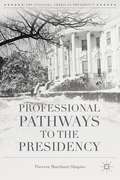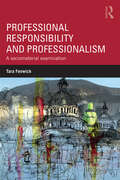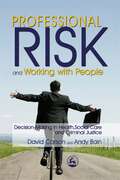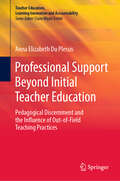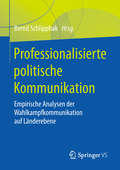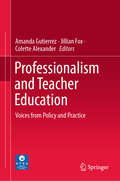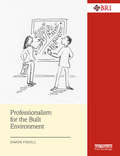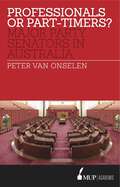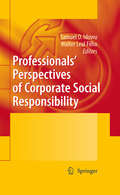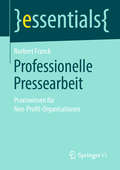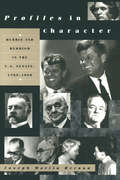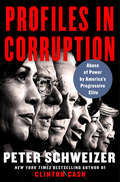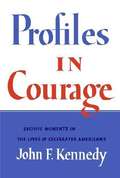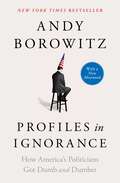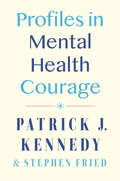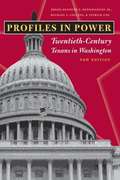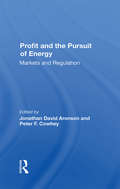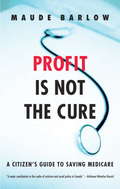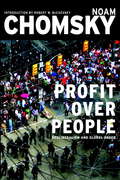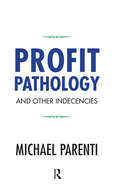- Table View
- List View
Professional Pathways to the Presidency
by Theresa Marchant-ShapiroDuring presidential elections a quadrennial debate emerges, wherein candidates lay claim to qualification for the presidency based on their prior professional experiences. Usually this entails invoking the legacy of one of the great presidents, who followed the same trajectory to the White House. Missing from this debate is a systematic analysis of how the different job experiences prepared the population of all presidents for service. For each of the greats who followed a particular pathway to the presidency there is at least one failure who shared the pathway. This book takes both a quantitative and descriptive approach to evaluate all the presidents systematically in order to discuss how prior professional experiences influence presidential performances.
Professional Responsibility and Professionalism: A sociomaterial examination
by Tara FenwickResponsibility and professionalism are increasingly issues of concern for professional associations, employers and educators alike. When bad things happen, professionals are often held personally accountable for complex situations. Professional Responsibility and Professionalism advances our approaches to professional responsibility from individual-centred, virtue-based prescriptions towards understanding and responding effectively to the multifaceted challenges encountered today by professionals working in dynamic complexity. The author applies a sociomaterial examination to specific examples drawn from different professional contexts of practice. She examines important implications for what professional responsibility and accountability might mean individually and collectively, and what it might be becoming when demands increasingly conflict, and when we accept that capacities for action are performed into existence in emergent and precarious webs of both human and non-human forces. The chapters explore some of the most prominent questions in professional responsibility, including: What does professional responsibility, and accountability, mean in the escalating complexities and conflicts confronting today’s professionals? How does professional responsibility become developed and enacted, and through what social and material entanglements? How should responsibility be determined in multi-agency and interprofessional practice? What happens when professional decisions are delegated to software algorithms and diagnostic instruments? How are new governing regimes of professional work, such as innovation imperatives, excessive audit and logics of blame and scapegoating, reconfiguring responsibility? How can professionals respond simultaneously to individuals in need, the obligations of their profession, the demands of their employer and an anxious society? A major concern addressed by each chapter, and the book as a whole, is educating professionals in and for responsibility. Specific dilemmas and strategies are offered for educators in universities, workplaces and professional development contexts who seek new approaches to helping professionals learn to critically understand and practise responsibility today. This book will appeal to a wide audience of education researchers and post-graduate students studying professional practice, professionalism and education across a wide range of disciplines. Health professionals, professionals working in private practices, such as law, architecture and engineering, newer professions such as social work and policing, and educational professionals at all levels will find stories and strategies reflecting key issues of their practice in this detailed exploration of professional responsibility and accountability.
Professional Risk and Working with People: Decision-Making in Health, Social Care and Criminal Justice
by David Carson Andy BainProfessional Risk and Working with People provides advice on assessing and managing risks for all those employed to take risks with or on behalf of other people. The authors explore issues of risk assessment and management that provides readers with a broad knowledge of risk practices that can be applied across a range of disciplines. They detail the benefits of risk as well as the potential harm and explain relevant legislation and concepts of negligence in clear and accessible language. Examples of risk policies, systems and effective judgement in managing complex risk decisions are also included. In the current climate of blame and readiness to pursue legal action against professionals, this book will prove essential reading for all practitioners who come into contact with risk, including doctors and other health and care professionals, probation officers and social workers. Leaders of professional courses and their students will also find this an invaluable guide.
Professional Service Firms and Politics in a Global Era: Public Policy, Private Expertise
by Chris Hurl Anne VogelpohlThis volume explores the influence of professional service firms on public policy-making from a global perspective. Drawing on cases studies from around the world, researchers from different disciplines—including sociology, political science, geography, anthropology, history, and management studies—examine how professional service firms have generated power in the policy-making process. The chapters further investigate the structure and organization of these firms and their relationship with public agencies. They discuss the impact of strategies, techniques and models promoted by these firms on political decision-making. And they analyze how these firms have contributed to the formation of global policy-pipelines, facilitating the quick diffusion of policy ideas across time and space. Exposing how professional advisors can undermine democratic decision-making, the chapters in this book explore the potential for resistance and regulation of public-private relationships.
Professional Support Beyond Initial Teacher Education: Pedagogical Discernment and the Influence of Out-of-Field Teaching Practices (Teacher Education, Learning Innovation and Accountability)
by Anna Elizabeth Du PlessisThis book investigates the professional learning needs of teachers beyond initial teacher education, focusing on teachers in complex teaching positions, such as out-of-field teaching practices. The information presented here will help to improve professional learning strategies, while also offering an in-depth understanding of teachers’ needs, leaders’ perceptions, and what complex teaching situations mean for teachers’ professional learning and development. Further, Du Plessis shares the perceptions and lived experiences of teachers, parents, leaders and students as key stakeholders in quality teaching and learning environments.In light of new evidence-informed findings on the out-of-field phenomenon and continuing professional learning, Du Plessis puts forward strategies that will enhance the effectiveness of professional learning and development programs, while also fostering improved decision-making and policy development. In brief, Du Plessis focuses on the impact that complex teaching situations have on teachers’ unique needs, the support that is provided, and the influence of the out-of-field phenomenon on teachers’ responses to continuing professional learning and development programs.
Professionalisierte politische Kommunikation: Empirische Analysen Der Wahlkampfkommunikation Auf Länderebene
by Bernd SchlipphakZu welchem Ausmaß stellen Wahlkämpfe professionalisierte politische Kommunikation dar? Die These der Professionalisierung von Wahlkämpfen ist gerade im Hinblick auf die Wirkung von Kontextfaktoren – also im Vergleich von Staaten oder über Zeit hinweg – noch nicht systematisch untersucht worden. Die Beiträge in diesem Band analysieren unterschiedliche Aspekte der Professionalisierung von Wahlkämpfen auf der Ebene der deutschen Bundesländer – über Länder hinweg, über die Zeit und zwischen Parteien in einem Land. Dieser erste systematische Test der Professionalisierungsthese in einem föderalen System ermöglicht es, besonders die Wirkung von Kontextfaktoren auf die – stark variierende – Nutzung von Elementen der Professionalisierung in den Vordergrund zu rücken. Mit seinen Erkenntnissen, die auf innovativen empirischen Datenerhebungen beruhen, ist der Band für die wissenschaftliche und praktische Diskussion von größter Bedeutung.Der InhaltKampagnenstruktur • Kandidaten und ihre Partei • Kampagnenstrategie Der HerausgeberDr. Bernd Schlipphak ist Professor für empirische Methoden der Sozialwissenschaft am Institut für Politikwissenschaft an der Universität Münster.
Professionalism and Public Service
by David Siegel Kenneth RasmussenRepresenting the leading scholars in the field, Professionalism and Public Service assesses the state of public administration in Canada while also moving the discipline forward both as a profession and an academic discipline.The contributors to this volume trace the evolution of public administration institutions and explore issues such as the protection and improvement of the public service, recent innovations in the area of service delivery, and how this has created increased legitimacy and recognition from citizens. The various chapters also examine the importance of ongoing learning and training within the public service, and study many recent advances in teaching methods for both students as well as for public administration practitioners.Written in honour of Kenneth Kernaghan, the groundbreaking scholar who played an important role in public administration in Canada, Professionalism and Public Service thematically highlights some of his lasting contributions to the discipline. It is a history of the recent evolution of an essential part of Canadian governance and a fitting tribute to a distinguished scholar.
Professionalism and Teacher Education: Voices from Policy and Practice
by Jillian Fox Amanda Gutierrez Colette AlexanderThis book explores how educators are proactively working to reclaim teacher professionalism by engaging in exemplary practice and promoting quality education for all. It examines voices in contemporary Australian teacher education and how professionalism can contribute to achieving the multiplicity of purposes in education.The work of contemporary teachers and teacher educators, and perceptions about this work, have changed significantly. In recent times, governments have identified key issues linked to the quality of teachers, as presented in multiple inquiries, creating shifts in public policy and increasing regulation. Educators must work towards improving public and policy maker perceptions of teaching as a profession. Teacher educators make an important contribution in engaging in ongoing scholarship and debate that examine research and practice and speak back to managerial discourses on professionalism. It is through this work that educators shape and re-shape understanding of what it means to be a professional.
Professionalism for the Built Environment (Building Research and Information)
by Simon FoxellIn the aftermath of the Grenfell Tower tragedy, this new book provides thought provoking commentary on the nature of the relationship between society, the prevailing economic system and professionalism in the built environment. It addresses the changing responsibilities of professionals and in particular their obligation to act in the wider public interest. It is both an introduction to and an examination of professionalism and professional bodies in the sector, including a view of the future of professionalism and the organisations serving it. Simon Foxell outlines the history of professionalism in the sector, comparing and contrasting the development of the three major historic professions working in the construction industry: civil engineering, architecture and surveying. He examines how their systems have developed over time, up to the current period dominated by large professional services firms, and looks at some options for the future, whilst asking difficult questions about ethics, training, education, public trust and expectation from within and outside the industry. The book concludes with a six-point plan to help, if not ensure, that the professions remain an effective and essential part of both society and the economy; a part that allows the system to operate smoothly and easily, but also fairly and to the benefit of all. Essential reading for built environment professionals and students doing the professional studies elements of their training or in the process of applying for chartership or registration. The issues and lessons are applicable across all building professions.
Professionalization of Foreign Policy: Transformation of Operational Code Analysis
by Michael HaasThis book identifies why presidents, prime ministers, and other leaders of countries often make blunders in foreign policy. Blunders have been recognized within the study of foreign policy, but no central methodology or theory has developed to provide a way to avoid future disasters. Options are often presented to leaders of countries by advisers who do not always assess which policies will best serve national interests. Presidents, prime ministers, and other leaders of countries then have their legacy judged accordingly. Therefore, the book reviews existing efforts at developing theories of foreign policy to determine why they have failed. Instead of allowing a discipline with a lot of competing theories to continue to flounder, the book consolidates all approaches and develops a new professional format that will serve to professionalize foreign policy decision-making so that fewer key decisions are ever again considered blunders.
Professionals or Part-timers?: Major Party Senators in Australia
by Peter van OnselenWhile the minor party and independent senators might attract media attention, the overwhelming majority of Australia's upper house members are affiliated with the major political parties. These senators are highly partisan: they are dependent on the party for re-election and play a potentially vital role in assisting their parties to secure the maximum number of House of Representative seats, acting as 'shock troops' in marginal seat campaigning. How does this impact the way these senators go about their business? How do they serve their party in the pursuit of lower house seats, the result of which determines who forms government? Professionals or Part-Timers? examines the electoral professionalism of major party senators, as well as how they deal with the sometimes competing interests of factionalism and personal ambition.
Professionals´ Perspectives of Corporate Social Responsibility
by Samuel O Idowu Walter Leal FilhoSince the general acceptance of the field of corporate social responsibility worldwide, corporate entities and those who act for them either as executives or "ordinary" employees are expected to be socially responsible. Being socially responsible has a number of quantifiable and unquantifiable benefits for the entity and its stakeholders. It improves the entity's bottom line results, protects jobs, and is also better for the environment. As such, it makes good sense for professionals and those that they interact with as colleagues, suppliers of goods and services, lenders etc to want to take the issue of CSR seriously. This perhaps explains why this book has chosen to explore how 19 professions across the world have integrated and continue to impress upon their staff the importance of CSR in their operational activities. We are constantly reminded that our world's natural resources are exhaustible; we can therefore no longer live for today alone if we do not want to cause substantial problems for future generations.
Professionelle Pressearbeit: Praxiswissen für Non-Profit-Organisationen (essentials)
by Norbert FranckDieses essential vermittelt das Know-how für einen erfolgreichen Umgang mit den entscheidenden Instrumenten jeder Pressearbeit. Im Mittelpunkt stehen praxisorientierte Antworten auf zentrale Fragen jeder Pressearbeit: Wie erzielt eine Non-Profit-Organisation (NPO) mit ihrer Pressearbeit Aufmerksamkeit und Reputation? Wie sind Informationen aufzubereiten, dass sie das Interesse von Journalistinnen und Journalisten wecken? Wie mit Journalistinnen und Journalisten – auch in kritischen Situationen – professionell umgehen? Wie Krisensituationen durch gekonnte Pressearbeit meistern?
Professionelle Unterrichtswahrnehmung im sozialwissenschaftlichen Fachunterricht: Das Potential von Animationsfilmen realer Unterrichtsszenen für die Lehrer*innenbildung (Politische Bildung)
by Sabine Manzel Katrin Hahn-Laudenberg Dorothee Gronostay Jutta TeuwsenDieses Open-Access-Buch bietet theoretische Grundlagen und praktische Beispiele zur Förderung der professionellen Unterrichtswahrnehmung von (angehenden) Lehrkräften im sozialwissenschaftlichen Fachunterricht. Im Fokus steht das Potential von Animationsfilmen realer Unterrichtsszenen, die mit diesem Band erstmals als innovatives Lehr-/Lernmedium für die Lehrer*innenbildung vorgestellt werden. Die Autor*innen konzeptionalisieren einen fachdidaktischen Zugang zum allgemeindidaktischen Modell der professional vision und präsentieren systematisch erprobte und modular einsetzbare Lehr-/Lernmaterialien zur Arbeit mit Animationsfilmen in der Lehrer*innenbildung. Alle vorgestellten Lehr-/Lernmaterialien sowie die Animationsfilme von Unterricht sind für Interessierte frei zugänglich und im Band entsprechend verlinkt.
Profiles in Character: Hubris and Heroism in the U.S. Senate, 1789-1996
by Joseph Martin HernonA take-off of Kennedy's Profiles in Courage, which argues that the best-known US senators don't deserve their renown as much as some lesser-known ones. Over the course of ten biographical chapters, this book tells the story of 16 men's lives in the Senate in relation to each other.
Profiles in Corruption: Abuse of Power by America's Progressive Elite
by Peter SchweizerWashington insiders operate by a proven credo: when a Peter Schweizer book drops, duck and brace for impact. <p><p> For over a decade, the work of five-time New York Times bestselling investigative reporter Peter Schweizer has sent shockwaves through the political universe. Clinton Cash revealed the Clintons’ international money flow, exposed global corruption, and sparked an FBI investigation. Secret Empires exposed bipartisan corruption and launched congressional investigations. And Throw Them All Out and Extortion prompted passage of the STOCK Act. Indeed, Schweizer’s “follow the money” bombshell revelations have been featured on the front pages of the New York Times and the Wall Street Journal, and regularly appear on national news programs, including 60 Minutes. <p> Now Schweizer and his team of seasoned investigators turn their focus to the nation’s top progressives—politicians who strive to acquire more government power to achieve their political ends. <p> Can they be trusted with more power?In Profiles in Corruption, Schweizer offers a deep-dive investigation into the private finances, and secrets deals of some of America’s top political leaders. And, as usual, he doesn’t disappoint, with never-before-reported revelations that uncover corruption and abuse of power—all backed up by a mountain of corporate documents and legal filings from around the globe. Learn about how they are making sweetheart deals, generating side income, bending the law to their own benefits, using legislation to advance their own interests, and much more. <p> Profiles in Corruption contains tomorrow’s headlines. <p><b>A New York Times Bestseller</b>
Profiles in Courage
by John Fitzgerald Kennedy"This is a book about that most admirable of human virtues--courage... and these are the stories of the pressures experienced by eight United States Senators and the grace with which they endured them--the risks to their careers, the unpopularity of their courses, the defamation of their characters, and sometimes, but sadly only sometimes, the vindication of their reputations and their principles." <P><P> During 1954-1955, John F. Kennedy, then a U.S. Senator, chose eight of his historical colleagues to profile for their acts of astounding integrity in the face of overwhelming opposition. These heroes include John Quincy Adams, Daniel Webster, Thomas Hart Benton, and Robert A. Taft. <P><P> Awarded the Pulitzer Prize in 1957, Profiles in Courage resounds with timeless lessons on the most cherished of virtues and is a powerful reminder of the strength of the human spirit.
Profiles in Ignorance: How America's Politicians Got Dumb and Dumber
by Andy BorowitzAndy Borowitz, “one of the funniest people in America” (CBS Sunday Morning), brilliantly examines the intellectual deterioration of American politics, from Ronald Reagan to Dan Quayle, from George W. Bush to Sarah Palin, to its apotheosis in Donald J. Trump. <p><p>The winner of the first-ever National Press Club award for humor, Andy Borowitz has been called a “Swiftian satirist” (The Wall Street Journal) and “one of the country’s finest satirists” (The New York Times). Millions of fans and New Yorker readers enjoy his satirical news column “The Borowitz Report.” Now, in Profiles in Ignorance, he offers a witty, spot-on diagnosis of our country’s political troubles by showing how ignorant leaders are degrading, embarrassing, and endangering our nation. <p><p>Borowitz argues that over the past fifty years, American politicians have grown increasingly allergic to knowledge, and mass media have encouraged the election of ignoramuses by elevating candidates who are better at performing than thinking. Starting with Ronald Reagan’s first campaign for governor of California in 1966 and culminating with the election of Donald J. Trump to the White House, Borowitz shows how, during the age of twenty-four-hour news and social media, the US has elected politicians to positions of great power whose lack of the most basic information is terrifying. In addition to Reagan, Quayle, Bush, Palin, and Trump, Borowitz covers a host of congresspersons, senators, and governors who have helped lower the bar over the past five decades. <p><p>Profiles in Ignorance aims to make us both laugh and cry: laugh at the idiotic antics of these public figures, and cry at the cataclysms these icons of ignorance have caused. But most importantly, the book delivers a call to action and a cause for optimism: History doesn’t move in a straight line, and we can change course if we act now. <p> <b>New York Times Bestseller</b>
Profiles in Mental Health Courage
by Stephen Fried Patrick J. KennedyOne of Harvard Public Health Magazine's Best Public Health Books of the YearProfiles in Mental Health Courage portrays the dramatic journeys of a diverse group of Americans who have struggled with their mental health. This book offers deeply compelling stories about the bravery and resilience of those living with a variety of mental illnesses and addictions. Several years ago, Patrick J. Kennedy shared the story of his personal and family challenges with mental illness and addiction—and the nation&’s—in his bestselling memoir, A Common Struggle. Now, he and his Common Struggle coauthor, award-winning healthcare journalist Stephen Fried, have crafted this powerful new book sharing the untold stories of others—a special group who agreed to talk about their illnesses, treatments, and struggles for the first time. When Kennedy&’s uncle, President John F. Kennedy, published his classic book Profiles in Courage, he hoped to inspire &“political courage&” by telling the stories of brave U.S. senators who changed America. In Profiles in Mental Health Courage, former Congressman Kennedy adapts his uncle&’s idea to inspire the &“mental health courage&” it takes for those with these conditions to treat their illnesses, and risk telling their stories to help America face its crisis in our families, our workplaces, our jails, and on our streets. The resounding silence surrounding these illnesses remains persistent, and this book takes an unflinching look at the experience of mental illness and addiction that inspires profound connection, empathy, and action.In this book, you&’ll meet people of all ages, backgrounds, and futures, across politics and government, Hollywood and the arts, tech and business, sports and science—some recovering, some relapsing, some just barely holding on, but all sharing experiences and insights we need to better understand. You&’ll also meet those trying to help them through—parents, siblings, spouses, therapists, bosses, doctors, and friends who create the extended families needed to support care and wellness. The personal stories they share with Kennedy and Fried are intimate, sometimes shocking, always revealing. And they are essential reading for caregivers, family members, policymakers, and the general public—just as they are for those who often feel alone in experiencing these challenges themselves.
Profiles in Power: Twentieth-Century Texans in Washington, New Edition
by Kenneth E. Patrick Cox Michael L. Collins Jr. HendricksonProfiles in Power offers concise biographies of fourteen twentieth-century Texans who wielded significant political power and influence in Washington, D.C. First published in 1993 by Harlan Davidson, it has been revised and updated with new chapters on John Nance Garner and Henry Gonzalez and expanded chapters on Lyndon Johnson, Barbara Jordan, Ralph Yarborough, Jim Wright, and John Tower. Demonstrating the validity of a biographical approach to history, the book as a whole covers all the major political issues of the twentieth century, as well as the pivotal role of Texans in defining the national agenda.
Profiles, Probabilities, and Stereotypes
by Frederick SchauerThis book employs a careful, rigorous, yet lively approach to the timely question of whether we can justly generalize about members of a group on the basis of statistical tendencies of that group. For instance, should a military academy exclude women because, on average, women are more sensitive to hazing than men? Should airlines force all pilots to retire at age sixty, even though most pilots at that age have excellent vision? Can all pit bulls be banned because of the aggressive characteristics of the breed? And, most controversially, should government and law enforcement use racial and ethnic profiling as a tool to fight crime and terrorism? Frederick Schauer strives to analyze and resolve these prickly questions. When the law "thinks like an actuary"--makes decisions about groups based on averages--the public benefit can be enormous. On the other hand, profiling and stereotyping may lead to injustice. And many stereotypes are self-fulfilling, while others are simply spurious. How, then, can we decide which stereotypes are accurate, which are distortions, which can be applied fairly, and which will result in unfair stigmatization? These decisions must rely not only on statistical and empirical accuracy, but also on morality. Even statistically sound generalizations may sometimes have to yield to the demands of justice. But broad judgments are not always or even usually immoral, and we should not always dismiss them because of an instinctive aversion to stereotypes. As Schauer argues, there is good profiling and bad profiling. If we can effectively determine which is which, we stand to gain, not lose, a measure of justice.
Profit And The Pursuit Of Energy: Markets And Regulation
by Jonathan D Aronson Peter F CowheyAmong the books on the world energy crisis, on technological possibilities for self-sufficiency, and on various energy sources, this is one of a very few to address the practicalities of government regulatory responsibilities versus the pursuit of profit in the private sector and to look at the processes, logistics, and complex interactions among private energy companies, financial sectors, and national governments. The authors provide answers to such questions as: How do oil company operations influence government policies? What kinds of energy projects can be financed by existing financial institutions? How does the availability of insurance affect innovations in energy? They also examine how major investors and governments make decisions about the management of the volatile mix of political, economic, and technological risks that buffet the energy sector; critique the conventional wisdom concerning the major fuels; and project the likely evolution of the world energy market over the next decade.
Profit Is Not the Cure
by Maude BarlowOn July 12, 1966, the Medical Care Insurance Act was passed by the federal House of Commons after a ferocious public debate that pitted the vast majority of Canadians against a powerful alliance of business, insurance companies, and doctors.More than thirty years later, the same battle is being fought all over again. Only now, the forces opposed to medicare are more ideologically unified, more richly endowed, and tied to transnational corporations whose power exceeds that of entire countries.In Profit Is Not the Cure, Maude Barlow traces the history of medicare in Canada. She compares it with both public and private systems in other parts of the world. And she contrasts it with the brutally divisive system that exists in the United States, where forty-four million people have no medical insurance, and millions more get minimal care through profit-driven health maintenance organizations. From the point of view of most patients, the United States health-care model is a disaster. But the proponents of privatization in Canada, supported by the right-wing media and corporate lobbyists, are determined to impose American-style "reforms" on the Canadian public. Three provinces - British Columbia, Alberta, and Ontario - are moving ahead rapidly to enlarge the role of commerce in the provision of health-care services. They are introducing user fees, delisting procedures that previously were covered, and encouraging private corporations to move into areas that used to be the exclusive domain of the public system.While the prime minister and federal cabinet have paid lipservice to the principles of medicare, they have made it clear by their actions that they will do nothing to impede the destruction of those principles by the provinces. In fact, their enthusiastic support of NAFTA, and the impending Free Trade Agreement of the Americas (FTAA) and General Agreement on Trade in Services (GATS), has made the defence of medicare increasingly difficult. Canadians overwhelmingly support medicare. Many, however, have been persuaded that it is a luxury we can no longer afford. Maude Barlow argues that this proposition is wrong. An earlier generation fought a bitter battle to bring medicare into existence. Another battle must be fought now to save it. But we owe it to the founders of the system, as well as to future generations, to take up the cause again. This important book shows the way.From the Hardcover edition.
Profit Over People: Neoliberalism and Global Order
by Noam ChomskyWhy is the Atlantic slowly filling with crude petroleum, threatening a millions-of-years-old ecological balance? Why did traders at prominent banks take high-risk gambles with the money entrusted to them by hundreds of thousands of clients around the world, expanding and leveraging their investments to the point that failure led to a global financial crisis that left millions of people jobless and hundreds of cities economically devastated? Why would the world's most powerful military spend ten years fighting an enemy that presents no direct threat to secure resources for corporations? The culprit in all cases is neoliberal ideology--the belief in the supremacy of "free" markets to drive and govern human affairs. And in the years since the initial publication of Noam Chomsky's Profit Over People: Neoliberalism and Global Order, the bitter vines of neoliberalism have only twisted themselves further into the world economy, obliterating the public's voice in public affairs and substituting the bottom line in place of people's basic obligation to care for one another as ends in themselves. In Profit Over People, Chomsky reveals the roots of the present crisis, tracing the history of neoliberalism through an incisive analysis of free trade agreements of the 1990s, the World Trade Organization, and the International Monetary Fund--and describes the movements of resistance to the increasing interference by the private sector in global affairs. In the years since the initial publication of Profit Over People, the stakes have only risen. Now more than ever, Profit Over People is one of the key texts explaining how the crisis facing us operates--and how, through Chomsky's analysis of resistance, we may find an escape from the closing net.
Profit Pathology and Other Indecencies
by Michael ParentiFrom market crisis to market boom, from welfare to wealth care, from homelessness to helplessness, and an all-out assault on the global environment-these are just some of the indecencies of contemporary economic life that Profit Pathology takes on. Here, Michael Parenti investigates how class power is a central force in our political life and, yet, is subjected to little critical discernment. He notes how big-moneyed interests shift the rules of the game in their favor while unveiling the long march by reactionaries through the nation's institutions to undo all the gains of social democracy, from the New Deal to the present. Parenti also traces the exploitative economic forces that have operated through much of American history, including the mass displacement and extermination of Native Americans and the enslavement of Africans. Parenti is a master at demonstrating the impact of monomaniacal profit accumulation on social services-especially health care-and human values. Here he takes us one step further, showing how unrestrained capitalism ultimately endangers itself, becoming a "self-devouring beast" that threatens us all. Finally, he calls for a solution based on democratic diversity and public ownership-"because it works."
